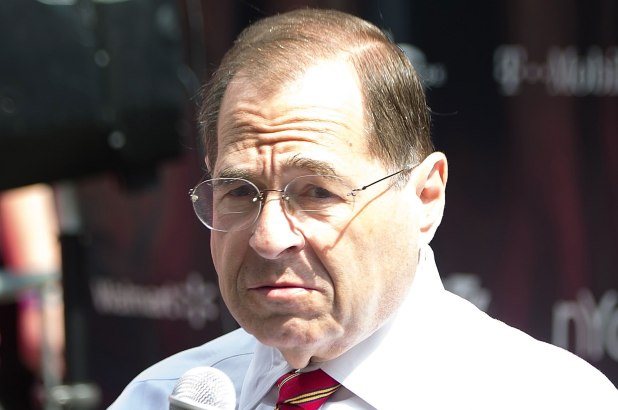
A D.C. federal judge on Wednesday shot down an attempt by House Judiciary Committee Democrats to link their subpoena for former White House counsel Don McGahn to a separate request for secret grand jury information from the Russia investigation after the Justice Department accused them of trying to “game the system.”
Normally cases are assigned to judges randomly, which the DOJ said is meant to keep parties from “attempting to game the system” by “shopping” for a judge they like. But in a Tuesday court filing, the department alleged the Democrat-controlled committee was trying to do exactly that by exploiting an exception that allows “related” cases to be heard by the same judge. In this case, the DOJ said the panel improperly sought to connect the McGahn case to the grand jury case simply because they’re both part of their investigation of President Trump.
“[A]t first blush, the House Judiciary Committee’s view that the related case rule applies is understandable,” D.C. District Court Chief Judge Beryl Howell wrote in her order rejecting the bid. “Nonetheless, closer examination demonstrates that these connections between the two cases are too superficial and attenuated for the instant McGahn Subpoena Case to qualify[.]”
Howell, who is currently assigned to the grand jury case, agreed with the DOJ’s argument that the committee’s request to unseal secret grand jury information from former special counsel Robert Mueller’s probe has to do with the application of the law under the Federal Rules of Criminal Procedure, while the McGahn case is a civil matter dealing with enforcing a subpoena where immunity has been asserted. Video
“This later-filed, subpoena-enforcement suit involves no issues of fact or law common to the earlier Grand Jury application, nor does it focus on a common event or transaction such that the matters would be ‘related,’” the DOJ argued in its court filing.
The House Judiciary Committee claimed that the cases are related because they both tie into what they are now calling an “impeachment investigation” of Trump. Their complaint against McGahn calls him the “most important witness, other than the President, to the key events that are the focus of the Judiciary Committee’s investigation” into Russian interference in the 2016 presidential election.
The DOJ, however, argued that the term “related” refers to cases that have “common issues of fact” or stem from a “common event or transaction.” They claimed the committee “gets it backwards” because they are “trying to relate completely unrelated cases simply because it filed them in service of its overarching desire to bring various matters together in its investigation of the President.”
McGahn’s refusal to comply with a subpoena is the real “event or transaction” in this case, the DOJ said, “not the Committee’s asserted ‘impeachment investigation.’”
Howell also identified the legal issues in the grand jury case, pointing out that those issues “are entirely absent” from the McGahn case.
The Justice Department also countered the committee’s claim that linking the cases would make the judicial process more efficient by noting that while the committee knew about McGahn’s refusal to testify back in May, they waited until August – soon after filing the grand jury information case – to sue over it.
“Thus, any delay is the Committee’s doing at this point,” the DOJ said, questioning how getting around the random judge assignment process would help make things go faster.
Judge Howell countered the committee’s argument by saying that “judicial efficiency is not served where two cases present such different factual and legal issues, as is the circumstance here.”
The McGahn case will now be transferred to the Calendar and Case Management Committee to be randomly reassigned.
The existence of an “impeachment investigation” has also been called into question. House Judiciary Committee Chairman Rep. Jerrold Nadler, D-N.Y., has stated that “formal impeachment proceedings” are underway, but the committee’s ranking Republican Rep. Doug Collins, R-Ga., said that is impossible because the House never voted to approve such an investigation.
Several House Democrats have claimed that a vote is not necessary, either because the Constitution grants them the power to conduct impeachment investigations or because a recent expansion of committee powers allows it.
By Ronn Blitzer
Tired of Facebook? Check out Conservative-friendly social media. Join FREE today: PlanetUS
Watch this 30 sec. video about PlanetUS:


Leave a Reply